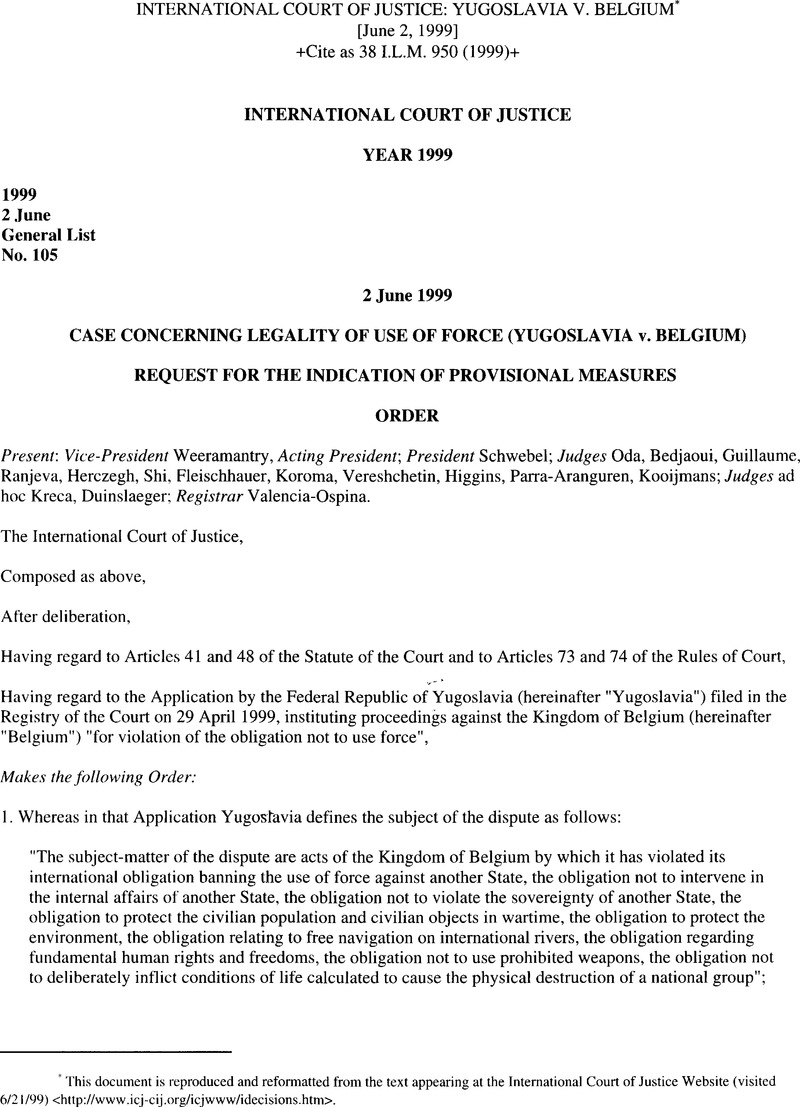No CrossRef data available.
Article contents
International Court of Justice: Yugoslavia v. Belgium
Published online by Cambridge University Press: 27 February 2017
Abstract

- Type
- ILM Special Section on ICJ Decisions on Legality of Use of Force
- Information
- Copyright
- Copyright © American Society of International Law 1999
References
* This document is reproduced and reformatted from the text appearing at the International Court of Justice Website (visited 6/21/99) <http://www.icj-cij.org/icjwww/idecisions.htm>.
1 Article 1 of the Warsaw Treaty reads as follows:“The Contracting Parties undertake, in accordance with the Charter of the United Nations … to settle their international disputes by peaceful means” (UNTS, Vol. 219, p. 26).” Article 1 of the North Atlantic Treaty reads as follows:“The Parties undertake, as set forth in the Charter of the United Nations, to settle any international dispute in which they may be involved by peaceful means in such a manner that international peace and security and justice are not endangered, and to refrain in their international relations from the threat or use of force in any manner inconsistent with the purposes of the United Nations.” (UNTS, Vol. 34, p. 244; NATO basic documents, 1981, p. 10.)
2 For an analysis of the discussions in the General Assembly on the importance of these principles see further V.S. Mani Basic Principles of Modern International Law, 1993.
3 Statute of the Court, Article 9.
4 See Wigmore, J., A Panorama of the World's Legal Systems, 1928, Vol. 2, pp. 489 Google Scholar et seq; Jayetileke, K.N., “The Principles of International Law in Buddhist Doctrine”, 7967 Recueil de Cours, p. 447;Google Scholar L.P.N. Perera, Buddhism and Human Rights, 1991, pp. 40-41.
5 See Dhammapada, verse 201; Kunala Jataka, The Jataka, Vol. V, pp. 412-414. The conceptual basis of this Buddhist stress on peaceful settlement is encapsulated in verse 201 of the Dhammapada. One who defeats others creates enemies for himself One who is defeated by others feels sad and frustrated One who defeats the inner need to defeat others remains happy and satisfied at all times.
6 See generally Weeramantry, C.G., “Some Buddhist Perspectives on International Law” in Boutros Boutros-Ghali; Amicorum Discipulorumque Liber, 1999, pp. 775, 804-805.Google Scholar




